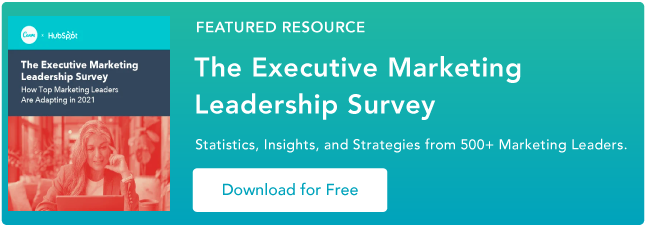Leadership isn’t just about control — it’s also about actions and behaviors. As a leader, do your current leadership behaviors align with both your and your team's goals? And does your behavior boost your team’s morale or bring the mood down — resulting in high turnover and less efficiency? To help you answer those questions, we've put together a breakdown of the kind of conduct that leaders should exhibit.
.png)
Free Leadership Lessons Guide
Actionable leadership advice from HubSpot's Co-Founder, Dharmesh Shah.
- Qualities of Confident People
- Leading By Example
- Recognizing Excellence
- And More!
Download Free
All fields are required.
.png)
What are leadership behaviors?
Leadership behaviors are actions and conduct that leaders incorporate into their management styles in order to effectively lead their teams, motivate them, and achieve their goals.
Leaders who don't possess these behaviors may struggle with completing objectives, maintaining a healthy work environment, or managing their team members.
loading="lazy"With that in mind, let's take a look at 30 examples of leadership behaviors that will benefit both you and your team.
→ Click here to download leadership lessons from HubSpot founder, Dharmesh Shah [Free Guide].
Effective Leadership Behaviors Examples
1. Compassion
Compassion means having sympathy and concern for others, especially when they are experiencing misfortune. Leading with compassion builds trust and promotes collaboration. Your employees will feel more comfortable confiding in you about issues that may be disrupting their workflow.
2. Adaptability
An excellent leader is always prepared to shift priorities and processes to adapt to changing market conditions. New viral social media sites are popping up every day. State-of-the-art technologies are always in development and changing the ways consumers interact with products and services. Adaptable leadership means working to keep up with these changes and ensuring that your business model is always up-to-date and evolving.
3. Coaching mindset
Having a coaching mindset means wanting to help your employees improve their skill set and grow both personally and professionally. As a leader, you should also act as a mentor by taking the time to get to know your employees and their goals to help set them up for success. Consider having training sessions that focus on specific areas of the business or set aside time for your employees to shadow colleagues in different departments — based on their interests.
4. Active listening
According to a 2021 global survey by The Workforce Institute at UKG, 74% of employees say they are more effective at their job when they feel heard. That same study also showed 88% of employees whose companies financially outperform others in their industry feel heard compared to 62% of employees at financially underperforming companies.
Active listening means giving the person who is speaking your full, undivided attention. In tandem with listening to their words, you’re also analyzing what’s being said —paying close attention to the content, intentions, and emotion of the speaker. Employees appreciate this because it means they’re not only being heard they’re also being understood.
5. Motivation
You can’t expect your team to be motivated to reach new heights if you aren’t. Leaders set the tone for their team’s morale. Being a motivational leader means showing enthusiasm for the company’s future. It also means setting the vision for the company and getting team members equally excited about what’s to come.
6. Self-awareness
Being a self-aware leader means understanding your character and feelings. Knowing your character is important because it means you are aware of your strengths, weaknesses, and the way you respond to situations. This provides a foundation from which you can work to make improvements where need be. Being aware of your feelings also allows you to approach situations with clarity and a calm mind.
7. Confidence
In order for your team to believe in you, you must first believe in your own leadership abilities — that's why confidence is key. To build your confidence, repeat positive affirmations to yourself, practice good posture, speak clearly, and make eye contact while speaking. It’s easier said than done, but with good practice and repetition, your confidence will grow and your team will notice.
8. Assertiveness
Assertive leaders stand up for themselves, others, and what they believe in —but being assertive does not mean being "pushy" or "disrespectful." Stand up to others while remaining calm and positive.. Be direct and clear in your communication, and don’t just passively accept unfavorable responses.
9. Time management
An effective leader knows how to use their and their team’s time wisely. Leaders properly manage time by streamlining workflows to make processes more efficient. They also implement detailed plans that prioritize important tasks and take the amount of time it takes to complete them into account.
10. Detail-oriented
Completing a project on time is important, but timeliness means nothing if the project is riddled with errors or missing key components. A true leader pays close attention to detail to ensure high standards of quality are met. However, that does not mean a good leader lets their attention to detail interfere with important developments —it simply means they use their attention to detail to deliver thorough results.
11. Communication
As a leader, you must be able to clearly articulate your objectives. Communicating effectively means you can spend less time repeating yourself and more time taking action. So make sure your verbal communication is easy to understand. Another aspect of great communication is understanding how your team prefers to communicate. Do email updates help? How about weekly scheduled Zoom meetings and town halls? Pay close attention to the types of communication that yield the best results and implement them into your strategy.
12. Accountability
Accountability doesn’t just mean holding someone else to task for their behaviors —it also means holding yourself accountable. No leader is perfect, and part of establishing trust with your team is taking responsibility for your own shortcomings. If you missed a deadline or forgot to update your team on a project, take ownership and make a point to do better. Your team will respect your honesty and reflect it by holding themselves accountable as well.
13. Dependability
A dependable leader can be trusted to do what they say they’ll do, when they say they’ll do it, and the way it needs to be done. This instills confidence in the team and can inspire them to do the same. A leader who lacks dependability can shake a team’s morale, reduce efficiency, and lose out on important opportunities.
.png)
Free Leadership Lessons Guide
Actionable leadership advice from HubSpot's Co-Founder, Dharmesh Shah.
- Qualities of Confident People
- Leading By Example
- Recognizing Excellence
- And More!
Download Free
All fields are required.
.png)
14. Proactiveness
Proactive leadership means taking the time to plan, improve your team’s processes, and put initiatives in place to prevent problems before they arise. As a proactive leader, you should identify areas of risk for your team and work to minimize negative impacts or remove them altogether before issues pop up.
15. Planning
The key to being proactive is to plan. Plan the route to meet your goals and what you’ll do after. Plan for when things go right, and plan in case a project fails. Devise a plan for how each member in your team will contribute to the company’s objectives. Remember, if you stay ready, you’ll never have to get ready.
16. Problem solving
A leader must be able to find solutions to difficult or unpredictable problems, and in an ever-changing professional landscape, unpredictable problems happen by nature. A good leader also understands that they must also utilize the strengths of their teams to get over hurdles.
17. Responsibility
Responsible leaders own the fact that they have an obligation to make tough decisions, lead, and are in control of their team. They do not shy away from responsibility or accountability — and they’re not afraid to be decision-makers.
18. Goal-Oriented
As a goal-oriented leader, you must set clear and realistic goals for both yourself and your team — and be driven to achieve them. Consistent goal setting builds motivation and pushes the team to achieve important objectives and meet deadlines. To maintain a goal-oriented outlook, you must approach each task with a positive attitude.
19. Purpose
Purpose goes hand-in-hand with goal-setting. As a leader, you must have a clear future envisioned for your team that drives everyone forward. Where do all your goals lead to? What drives you to succeed and is that purpose clear to your employees?
20. Commitment
No matter your objective as a leader, reaching it requires commitment. A committed leader will give their time and energy to their company, team, and goals. Their go-getter attitude will also inspire their team to be committed to their tasks as well.
21. Resilience
Being a leader isn’t easy. Sometimes plans fail, markets shift, consumers change, and frustrations can arise. However, a resilient leader finds the strength to persevere through uncertainty or disappointment and helps their team stay the course to their goals.
22. Transparency
Lack of transparency can create distrust between you and your team. To be a transparent leader, you have to make yourself clear and easy to understand. You must also ensure the words you say match your tone and body language to avoid confusion. A transparent leader may not be able to tell the team everything, but they don't leave questions as to what they can or can’t share.
23. Personal fulfillment
A leader gets a sense of personal fulfillment when a project is completed successfully. That personal fulfillment is the result of alignment between their drive, purpose, and desire to achieve their goals alongside their team.
24. Reflection
A leader who practices reflection is an efficient leader. Reflection allows leaders to look back on previous experiences, learn from them, and make improvements going forward. As a leader, getting external feedback on your decisions can sometimes be difficult. Therefore, practicing self-reflection and taking careful consideration of your past actions can be great ways to help yourself expand your skill set.
25. Empathy
An empathetic leader is able to understand or feel what another person is experiencing by figuratively putting themselves in that person’s position. Being in tune with your team’s feelings and concerns can help you adjust expectations, get to the heart of certain issues, and instill trust. To build empathy, step outside your comfort zone and ask "How would I feel if this were happening to me?"
26. Constructive feedback
The individual members of your team have their own goals — just like you. As a leader you should be comfortable giving constructive feedback to your team members to help facilitate their growth and improve performance. Constructive feedback is informative, issue-specific, based on observation, and is delivered in a way that is not meant to offend or deter. Instead, constructive feedback is delivered to encourage a positive outcome.
27. Empowerment
Empowering your team means delegating specific tasks to team members and giving them authority over those tasks. This shows that you believe in your team’s capabilities and trust them to take charge of projects when necessary. This form of empowerment can also help team members broaden their skills and boost efficiency.
28. Interactive
Leadership isn’t just about keeping to yourself and making decisions solely on your own. It also means working with your team. An interactive leader keeps open lines of communication with their team, connects individuals to their teams via team building, and embraces new perspectives with enthusiasm.
29. Influential
In order to lead, an effective leader must exhibit high-influence behaviors that have an effect on the character, beliefs, actions, and development of their team. With words and examples, leaders set the tone for how projects are executed and have the power to change direction if need be. With low-influence behaviors, leaders will have to work harder to be heard and to have projects completed to their liking.
.png)
Free Leadership Lessons Guide
Actionable leadership advice from HubSpot's Co-Founder, Dharmesh Shah.
- Qualities of Confident People
- Leading By Example
- Recognizing Excellence
- And More!
Download Free
All fields are required.
.png)
30. Emotional Intelligence
Empathy, self-awareness, reflection, and compassion are all components of emotional intelligence. Any emotionally intelligent leader is aware and in control of how they express their emotions. By being in control of their emotions, an effective leader can handle their relationship with their team judiciously and respectfully. Emotional intelligence creates a healthy work environment in which everyone feels validated, heard, and respected.
If you don’t possess all the above listed behaviors, don’t worry. These are behaviors that can be honed over time with practice and initiative. Write down the behaviors you wish to develop, and start crafting a clear plan to do so. There is no better time to get started than the present.
.png?width=112&height=112&name=Image%20Hackathon%20%E2%80%93%20Vertical%20(39).png)



![The Most Common Leadership Styles & How I Found Mine [Expert Insights]](https://www.hubspot.com/hubfs/leadership-styles-4.jpg)

![The Content Marketer's Guide to Thought Leadership [+ Inspiring Examples & Expert Tips]](https://www.hubspot.com/hubfs/216_Thought%20Leadership.webp)



![The Best Ways to Get Visibility from Your CMO and Other Marketing Execs Who Can Move You Forward [Data]](https://www.hubspot.com/hubfs/marketing%20manager%20trying%20to%20increase%20marketing%20executive%20visibility%20in%20their%20role.jpg)

